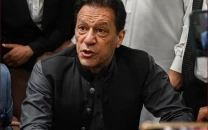Intellectual capital flight: To stop brain drain, give them incentives, say experts
Pakistani students and researchers studying abroad are tremendous resources for the country.

Pakistani students and researchers studying abroad are tremendous resources for the country. DESIGN: JAMAL KHURSHID
Experts say Pakistani and British universities can collaborate and build partnerships for research in diverse disciplines.
Pakistani students and researchers studying abroad are tremendous resources for the country. But experts at an international conference here on Thursday agreed that they can be more helpful if they returned after graduating and contributed to research and development here.
That will not be possible unless the government and universities come up with policies, incentives and quality academic environments to prevent flight of intellectual capital from Pakistan, researchers and educationists said.

Members of the academia were exploring these links between migration and education at an international conference, which began at the Quaid-i-Azam University (QAU) on Thursday.
The two-day conference, which focuses on “Migration, Education and Development in South Asia,” has been organised by the QAU Department of Anthropology and the Department of Social Anthropology at the UK’s University of Sussex in support of the Higher Education Commission, British Council, COMSATS Institute of Information Technology, Preston University and International Labour Organisation.
During the opening session, HEC Chairperson Imtiaz Hussain Gilani said the country was investing in training scientists and researchers. “But if the students decide to work abroad afterwards, then that is a heavy cost for the institutions.”
Gilani’s concern was substantiated by statistics Dr Ghulam Behlol shared at a research-sharing session later. Behlol, an Assistant Professor at Fatima Jinnah Women University, had set out to research the causes and effects of brain drain on universities.
In a sample collected from three universities, Behlol said 51 of 81 faculty members who had gone abroad for studies had simply not returned, with 20 of them not even bothering to resign from their posts.

“That is a great loss to the Pakistani universities and their departments,” Behlol said, suggesting that “we need to develop a mechanism to bring them back and formulate a national-level policy to attract talented Pakistanis to work in the country.”
Federal Minister of State for Education, Trainings and Standards in Higher Education Baleeghur Rehman, addressing the opening ceremony, said educational institutions and government bodies should do more to retain the best students.
He also suggested that students from underprivileged backgrounds should be provided opportunities to study abroad with conditions to return back after studies to contribute to the nation’s progress.
The argument that well-placed Pakistani researchers and scientists at foreign universities can bring back funding for projects and can facilitate Pakistanis applying to those universities was not brought up.
But Dr Filippo Osella, professor of Anthropology at Sussex University, said that approach is always limited and untenable. Osella, who is also the link coordinator of the British Council-HEC Inspire project, said over time scientists working abroad lose links with their home countries.
Instead Osella advocated the strategy of the project which has been going on for several years now and which facilitates Pakistani and British universities to collaborate and build partnerships for research in diverse disciplines.
The conference, which was structured with dozens of research presentation sessions running in parallel and panel discussions, also touched upon the impact of remittances on education, women empowerment through distance learning programmes and possible solutions for brain drain.
The conference will continue on Friday with discussions on the role of migration in education, the health sector, social development and socioeconomic change.
Published in The Express Tribune, March 28th, 2014.



















COMMENTS
Comments are moderated and generally will be posted if they are on-topic and not abusive.
For more information, please see our Comments FAQ